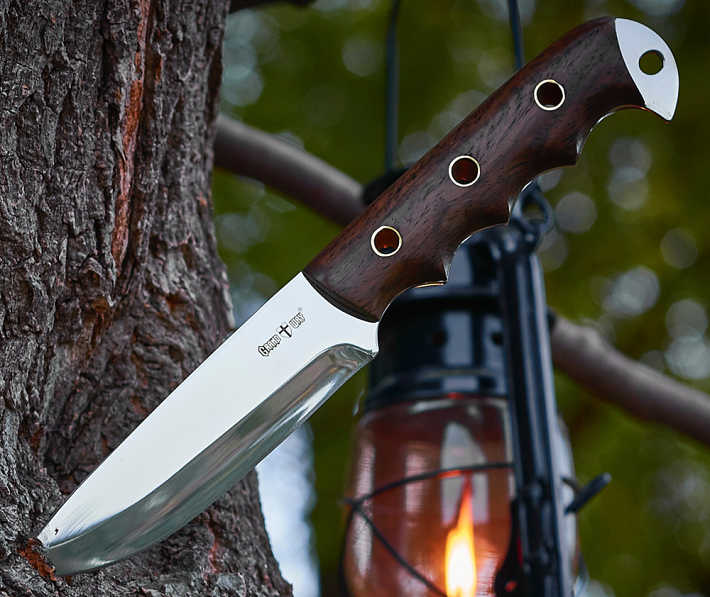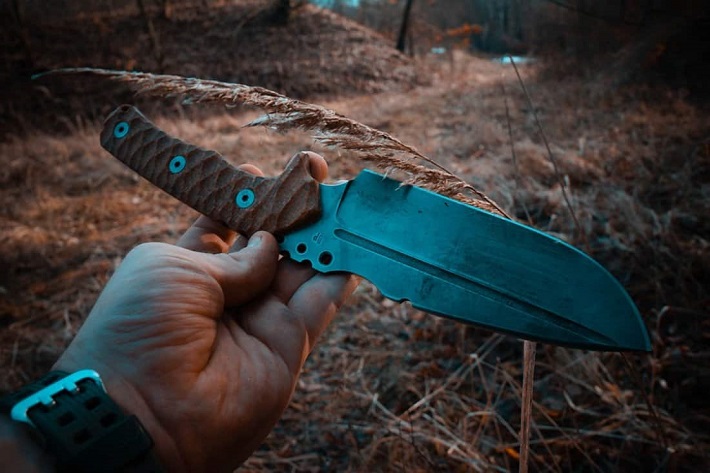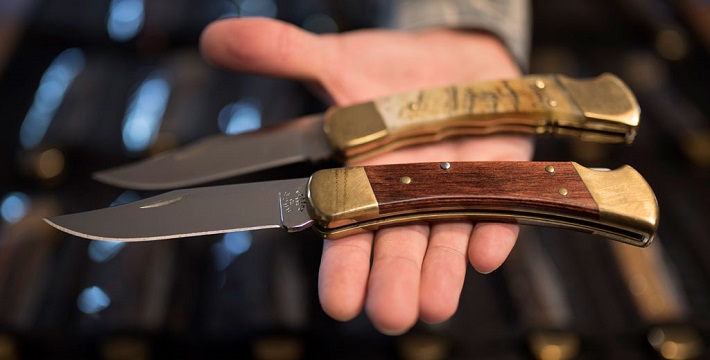One of the first steps to ensure a successful hunt is being adequately geared up. And while choosing the right hunting rifle certainly matters the most, you also shouldn’t overlook the importance of the little bits and pieces like hunting lights and hunting knives. Since we’ve already talked about how to pick suitable lights for hunting, this article will focus on helping you choose the right hunting knife.

Source: Rugged-man
What to Look for in a Hunting Knife?
Make Sure It’s the Right Type
When hunting, there are many instances where a knife can come in handy, like for instance when providing first-aid, tracking, brush removal, skinning game, building a campsite, etc. And all of these situations will require different types of knives. For example, the knife you use for cutting a rope or removing branches won’t be the same as the one you use to skin the game. Before you buy a good hunting knife, you should think about what you need it for. Depending on their purpose, there are several types of hunting knives:
- Camp Knives – Significantly large, these knives are considered all-purpose, ideal for many camping activities.
- Caping Knives – With a short blade that’s slightly curved upwards, these knives allow you to ensure the neck of your game is preserved. The reason why the blade is curved upwards is to enable you to make a smoother cut.
- Skinning Knives – Thanks to their short, thin and curved blade, these knives can cut through the game’s skin without damaging its muscles and tissues.
- Boning & Fillet Knives – The main purpose of these knives is to remove meat from the animal. Both of these knives have a narrower blade which is flexible to maneuver. It can get close to the animals’ bones, but it can also fit into small crevices like the ones around the ribs, ankles and shoulders.
- Gut Hooks – The gut hook knife is used for making organ removal easier without any damage.
Consider the Blade and Handle Material
The material of the blade you choose should be closely related to the environment in which you plan to hunt. For instance, if the environment is humid and you are planning to hunt near saltwater, you’ll have to choose a knife that is made of a material that is corrosion-resistant. What’s more, when hunting in wet humid conditions, you’ll have to use a knife that is easy to grip. Precisely for this, you need to pick the right blade and handle combo.
Some of the most common steels used for knife blades are:
- 420HC – This is a carbon stainless steel which makes sharpening easy. However, this steel isn’t as hard as some other blade steels.
- 440C – High in chromium content, these knives’ blades are extremely tough and resistant to corrosion.
- 1095 – The 1095 blade is non-stainless steel blade that is extremely strong but prone to rust. That being said, a knife with this blade needs to be lubricated regularly and stored properly.
- AUS-8 – This stainless steel blade has vanadium in it for extra hardness. The main downside of this blade is that it dulls quickly and needs frequent sharpening.
- Sandvik 12C27 – This blade has a medium carbon content that is empowered with chromium. It’s resistant to rust, it’s easy to maintain and care and can provide sharp and strong edges.
Regarding the handle, it can be made from a plethora of materials. Modern plastics, for instance, are a popular choice due to being extremely strong, easy to grip and clean. Micarta and polished woods are appealing but they can get slippery when in contact with sweat or other fluids. Knife handles can also be made of bone and antler which are strong and easy to grip. However, they are also some of the most expensive models.

Source: Mapthememories
Fixed or Folding Knives?
As the name implies, fixed knives have a permanent opened and fixed position, while folding knives can be folded into the handle. But what option is more suitable when hunting. The truth is, there’s no right or wrong choice with this one, as both fixed and folding knives have their own pros and cons when it comes to hunting.
Fixed Knives
When compared to foldable, fixed knives are stronger because the blade material runs through the handle, making it ideal for heavy-duty work. Besides being extremely durable, these knives are also easier to clean than foldable knives. The only downside of these knives is that they are larger than the foldable ones, which makes them less safe when carrying them around. However, this is something that can be easily resolved as you can always invest in a quality knife case.
Folding Knives
More convenient to carry, foldable knives are smaller in size and handy for opening with one hand. Unlike the fixed knives, the foldable ones are not as strong which makes them more appropriate for light use. They are also more difficult to clean because the blade channel collects blood, tissue and dirt which is hard to clean once dried. And speaking of cleaning.

Source: Northwestoutlet
How to Clean a Hunting Knife?
The first thing you’ll need to do is to wipe any blood or tissue from the knife immediately because the longer the stains sit there, the harder it will be to clean them off. Instead of putting it in hot water (to loosen any dried residues) and risking to damage its handle, you should understand how to properly clean your knife. Proper knife cleaning is important for prolonging its life.
What Is the Best Knife Sharpener for Hunting Knives?
Despite its purpose, you want to always keep your hunting knife as sharp as possible. And instead of risking to mess up the edges by sharpening them from a rock, for example, you should do it using the suggested knife sharpening method. By having a good sharpener and by learning how to use it properly, you’ll ensure your knife can always handle whatever you throw its way.



